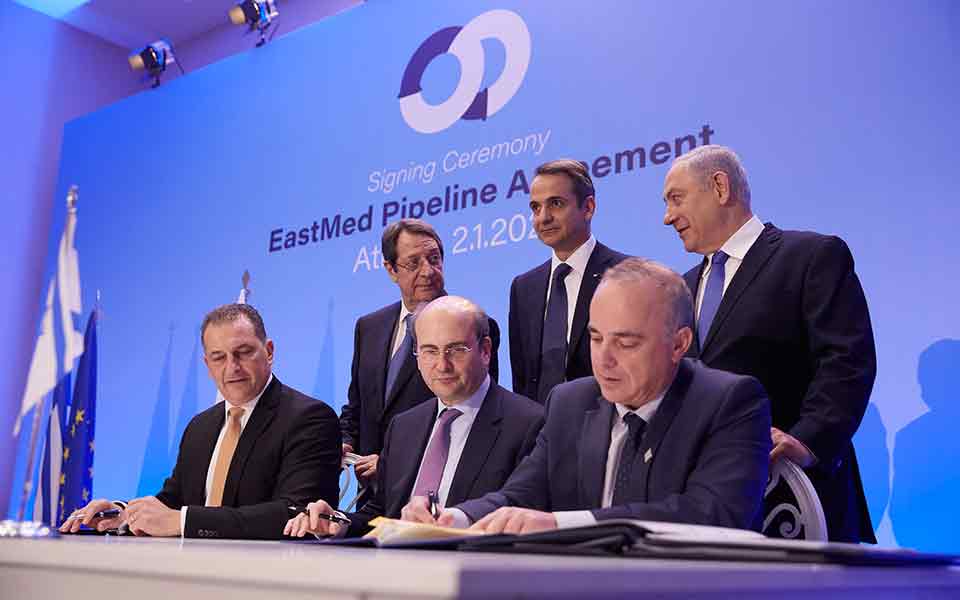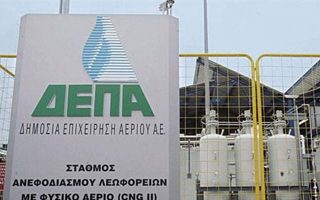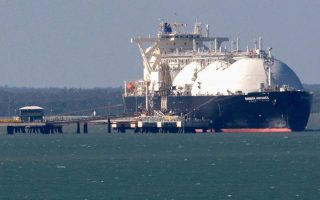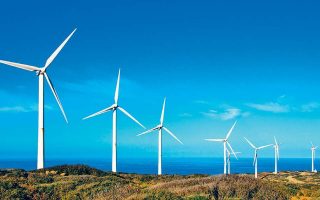Serving three major objectives at once

“Minister for PPC”: That’s what many people thought I was, until December, which was when public interest focused on the international energy plans, mainly due to tension with Turkey.
Of course Public Power Corporation is gradually taking its course, with the strengthening of its liquidity, the new law for the abolition of employees’ permanent status, the disengagement from lignite-powered output and opening up to renewable energy sources.
We march on, with a mountain of energy and environmental problems to tackle in front of us, from mining and metallurgical company Larco to garbage management.
However, on January 2 public interest turned entirely to the EastMed natural gas pipeline. This is an ambitious international energy project, which is not – as some people think – just a response to Turkey, but which forms part of a broader Greek strategy; this is a strategy with international, political, economic, energy and environmental dimensions.
Before this plan had come the signing of the agreement for the construction of the natural gas Interconnector Greece-Bulgaria (IGB), with works already under way. Furthermore, December saw the participation of Public Gas Corporation (DEPA) in the private project for the liquefied natural gas regasification station (a floating storage regasification unit) off Alexandroupoli, which will be connected with the IGB for the transmission of natural gas to Central Europe. As natural gas is the bridge-fuel until the full transition to green energy is complete, these are two projects that considerably enhance the country’s geostrategic position.
There is also Greece’s steady commitment to the electrical underwater connection of Crete, Cyprus and Israel. The EastMed pipeline – whose construction continues to be disputed by Turkish President Recep Tayyip Erdogan – is not only of geopolitical significance (with energy acting as a catalyst for peace and not as a pretext for tension), but also has a very interesting energy and environmental dimension. Natural gas from Israel and Cyprus – and, who knows, from Greece too a little later – increases the choices of European consumers and could offer the privilege of being combined with developments in renewable energy sources.
Notably, in Greece’s broader neighborhood (the Middle East and North Africa), thanks to wind power and even more to solar energy, there are considerable changes taking place in the energy market. This certainly also concerns Israel as well as Egypt, which are making a dynamic entry into the renewable energy sources market. These developments are combined with technological innovations such as the production of hydrogen from renewable energy sources. Such a development would change the landscape as it would lead – possibly earlier than some would imagine – to the forwarding of hydrogen mixed with natural gas from Egypt and Israel to Europe.
These developing innovations won’t just render a pipeline like EastMed “greener” and therefore “easier to finance”; they will also expand the basis of gas research into other sectors too, such as that of transport. Such an approach would change the way these traditional energy infrastructures are perceived by the next generations and for decades, improving the competitiveness and therefore the feasibility of EastMed in the immediate future.
Such an evolution would be necessary for Greece to constitute an active and forward-looking player that would become a two-way bridge for energy flows, investments and optimum technological applications between the eastern end of the Mediterranean and the energy market in Central Europe.
The institutional framework that will in practice facilitate and support this ambitious evolution forms part of the strategy of the European Green Deal and the gradual deepening and strengthening of the European Union strategy for a resilient Energy Union, although it is not limited to that: It is systematically being constructed at the regional level through initiatives such as the creation of the East Med Gas Forum, whose charter I signed last Thursday along with the ministers of five other countries in Cairo.
The geopolitical and economic developments taking place at a particularly rapid rate dictate decisive moves: the precautionary and active presence of our country in the region of its broader strategic interest; this is not only in the context of our necessary reaction against Turkish revisionism, but mainly in the context of the vision this government harbors for tomorrow’s Greece, a Greece that is export-orientated, productive and robust.
The pipelines and the moves in the global energy scene in general are not just lines on a map; they mainly have an important economic as well as environmental dimension.
The way things have developed, by implementing an energy policy which releases Greece’s creative forces and an environmental strategy that is harmonized with the European Green Deal, we are achieving three objectives simultaneously: We are taking into account the worries of our children about climate change, we are developing our economy, and we are strengthening the geostrategic position of Greece.
* Kostis Hatzidakis is Greece’s minister for the environment and energy.





